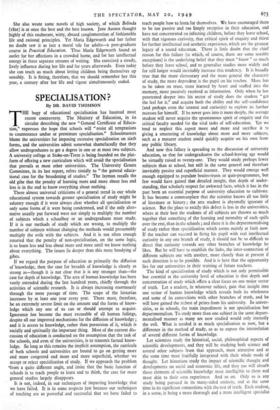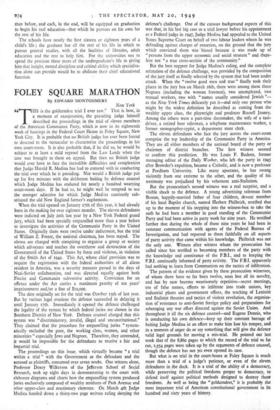SPECIALISATION?
By DR. DAVID THOMSON HE bogy of educational specialisation has haunted most recent controversy. The Ministry of Education, in its circular describing the new "General Certificate of Educa- tion," expresses the hope that schools will " resist all temptations to countenance undue or premature specialisation." Schoolmasters blame the universities for imposing excessive specialisation on sixth forms, and the universities admit somewhat shamefacedly that they allow undergraduates to get a degree in one or at most two subjects. A university college at Stoke-on-Trent is being founded on the plat- form of offering a new curriculum which will avoid the specialisation that prevails at most other universities. The University Grants Committee, in its last report, refers timidly to "the general educa- tional case for the broadening of studies." The layman recalls the old gibe that the penalty of learning more and more about less and less is in the end to know everything about nothing.
These almost universal criticisms of a general trend in our whole educational system towards greater specialisation of study might be salutary enough if it were always clear whether all specialisation or only some forms of it were being condemned, and if the only alter- native usually put forward were not simply to multiply the number of subjects which a schoolboy or an undergraduate must study. If it is our methods of study which are wrong, to multiply the number of subjects without changing the methods would presumably multiply the evils with the subjects. And it is not often enough retorted that the penalty of non-specialisation, on the same logic, is to learn less and less about more and more until we know nothing about everything. The issues lie deeper than this mere bandying of gibes.
If we regard the purpose of education as primarily the diffusion of-knowledge, then the case for breadth of knowledge is clearly as strong as—though it is not clear that it is any stronger than—the case for depth of knowledge. The area of human knowledge has been vastly extended during the last hundred years, chiefly through the activities of scientific research. It is always increasing enormously through the mere passage of time. The scope of the historian increases by at least one year every year. There must, therefore, be an extremely severe limit on the amount and the forms of know- ledge which any one of us can or should attempt to acquire. Ignorance has become the most excusable of all human failings, despite all our improved mechanisms for the diffusion of knowledge ; and it is access to knowledge, rather than possession of it, which is socially and spiritually the important thing. Most of the current dis- cussion of education is conducted on the assumption that the task of the schools, and even of the universities, is to transmit factual know- ledge. So long as this remains the implicit assumption, the curricula of both schools and universities are bound to go on getting more and more congested and more and more superficial, whether we accept or reject specialisation of study. If we approach the problem from a quite different angle, and insist that the basic function of schools is to teach people to learn and to think, the case for more general studies largely disappears.
It is not, indeed, in our techniques of imparting knowledge that we have failed. It is in some respects just because our techniques of teaching are so powerful and successful that we have failed to teach people how to learn.for themselves. We have encouraged them to be too passive and too limply receptive in their education, and have not concentrated on infecting children, before they leave school, with that vigorous curiosity, that critical spirit of enquiry and thirst for further intellectual and aesthetic experience, which are the greatest legacy of a sound education. There is little doubt that the chief reason for this failure (to which, of course, there are some notable exceptions) is the underlying belief that they must " know " so much before they leave school, and to generalise studies more widely and for still longer would inevitably increase this tendency. It is broadly true that the more elementary and the more general the character of study, the more dependent is the pupil on his teacher. More has to be taken on trust, more learned by heart and stuffed into the memory, more passively received as information. Only when he has penetrated deeper into his sector of study does the student "get the feel for it," and acquire both the ability and the self-confidence (and perhaps even the interest and curiosity) to explore its further recesses for himself. If he never goes into it more deeply, the average student will never acquire the spontaneous spirit of enquiry and the critical faculty needed for the vital tasks of self-education. Y„et we tend to neglect this aspect more and more and sacrifice it to giving a smattering of knowledge about more and more subjects, such as a maturer student could quickly acquire on his own from any public library.
And now this fallacy is spreading to the discussion of university education, so that for undergraduates the school-leaving age would be virtually raised to twenty-one. They would study perhaps fewer subjects than at school, but still in the same general and therefore inevitably passive and superficial manner. They would emerge well enough equipped to populate brains-trusts or quiz-programmes, but few would have gained that detailed insight, that depth of under- standing, that scholarly respect for awkward facts, which it has in the past been an essential purpose of university education to cultivate. It has become a commonplace that the scientist knows all too little of literature or history ; the arts student is abysmally ignorant of science. But the place to rectify this defect is less in the universities, where at their best the students of all subjects are thrown so much together that something of the learning and mentality of each spills over the rest, than in the schools ; and there it is the departmentalising of study rather than specialisation which seems mainly at fault now. If the teacher can succeed in firing his pupil with real intellectual curiosity in any one branch of study, it should not be so difficult to direct that curiosity towards any other branches of knowledge he likes. But he will have to establish the links, the inter-connection of different subjects one with another, more closely than at present if such direction is to be possible. And it is here that the opportunity lies for our universities in their training of future teachers.
The kind of specialisation of study which is not only permissible but essential at the university level of education is that depth and concentration of study which offers a clear focus on one major sector of truth. Let a student, in whatever subject, gain that insight into one sector of human knowledge which reveals both its wholeness and some of its connections with other branches of truth, and he will have gained the richest of prizes from his university. In univer- sities, as in schools, the main impediment is not specialisation but departmentalism. To study more than one subject in the same depart- mentalised manner as many are now studied would only intensify the evil. What is needed is as much specialisation as now, but a difference in the method of study, so as to expose the interrelation of several different forms of knowledge.
Let scientists study the historical, social, philosophical aspects of scientific developments, and they will be studying both science and several other subjects from that approach, most attractive and at the same time most fruitfully integrated with their whole mode of thought. Let historians study the impact of scientific thought and developments on social and economic life, and they too will absorb those elements of scientific knowledge most intelligible to them and most akin to their own experience. And so on. Only so is any study being pursued in its many-sided entirety, and at the same time in its significant connections with the rest of truth. Each student, in a sense, is being a more thorough and a more intelligent specialist
than before, and each, in the end, will be equipped on graduation to. begin his real education—that which he pursues on his own for the rest of his life.
The schools have nearly the first sixteen or eighteen years of a child's life ; the graduate has all the rest of his life in which to pursue general studies, with all the facilities of libraries, adult education and the rest to help him. For the universities not to spend the precious three years of the undergraduate's life in giving him that insight, mental discipline and critical ability which specialisa- tion alone can provide would be to abdicate their chief educational function.











































 Previous page
Previous page